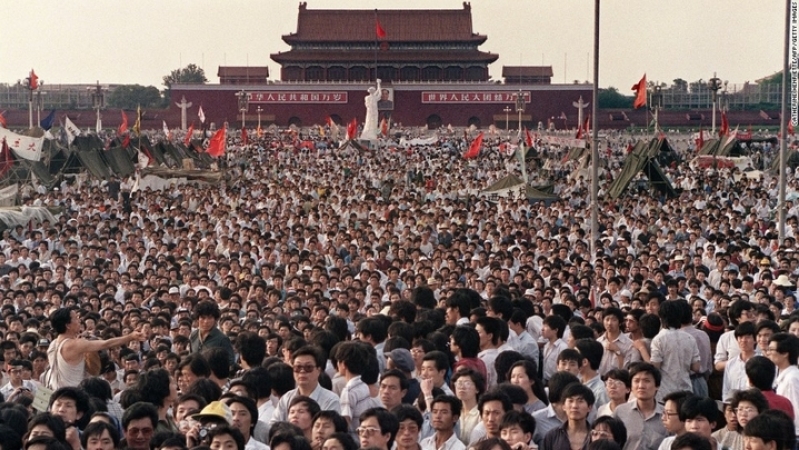
Over the weekend, tens of thousands of people gathered in Hong Kong for a candlelight vigil to mark the 28th anniversary of the Tiananmen Square massacre, which left thousands of people dead and all but snuffed out the democratic movement.
The event, held in Hong Kong's Victoria Park, drew some 110,000 people, according to Reuters.
"The students who died (in 1989) still haven't got what they deserve. They fought for their future, in the same way we're fighting for our future," Yanny Chan, a 17-year-old high school student at the vigil, said.
On June 4th, 1989, Chinese troops violently reclaimed the square in Beijing which pro-democracy protesters had occupied for weeks. The protesters, many of them students, were calling upon the government to embrace democratic reform, end press censorship and reveal how much government workers are paid, among other demands.
Instead, 11 divisions of the the Chinese army, including tanks and armored cars, descended on Tiananmen Square, attacking the civilians, shooting them in the back as they tried to flee. Many were killed when a tank drove into crowds, and still others were taken away by police for interrogation.
Nearly three decades later, Chinese authorities have yet to release an official death toll, and internet censorship is tightened during this time of each year in an attempt to erase the incident from Chinese history. However, experts estimate that anywhere from several hundred to several thousand were killed. Since then, several dozen more people have been executed for their parts in the demonstrations.
Chinese officials have also banned any public commemoration of the event on the mainland; thus, Hong Kong is the only place on Chinese soil where a large-scale vigil takes place. This weekend, Chinese police engaged in heightened surveillance to prevent any public recognition of the anniversary, according to the Financial Times.
This year's commemoration was particularly tense, Reuters notes, as it comes just a month before an expected visit of President Xi Jinping to mark 20 years since Hong Kong was handed back to China.
"When Xi Jinping comes, he'll know the people of Hong Kong have not forgotten," Lee Cheuk-yan, an organizer of the annual candlelight vigil, said.
On Sunday, Secretary of State Rex Tillerson slammed China for suppressing the truth about the Tiananmen Square massacre and called on the country to open up about those who were "killed, detained or missing".
"This year marks the 28th anniversary of the Chinese government's violent suppression of a peaceful protest that took place in and around Tiananmen Square," Tillerson said in a written statement.
"We call again on China to make a full accounting of those killed, detained, or missing due to the events of June 4, 1989. We urge China to cease harassment of family members seeking redress and to release from prison those who have been jailed for striving to keep the memory of Tiananmen Square alive.
"The United States views the protection of human rights as a fundamental duty of all countries, and we urge the Chinese government to respect the universal rights and fundamental freedoms of all its citizens."
While China has seen great economic progress since that notorious day in 1989, there has been little political reform; the government has continued to crack down on religious freedoms as well, imposing penalties on those involved with unregistered house churches.
But despite the Chinese government's best efforts to stifle religious freedoms, the events at Tiananmen Square helped spread the gospel in an astounding way, according to Loyola University of Maryland professor Carsten Vala.
"The brutal massacre caused many Chinese intellectuals and other elites to lose faith in communism and embrace Christianity," said Vala. "Following the events, China's church has grown so large that the Communist Party fears its influence."
Vala added that there are two important ways Christians in the United States can help the growing church in China: a"I think the first thing is to learn more about the diversity of the church. The churches are, some are still flourishing while others are being persecuted," she said.
"Secondly, I think the churches can develop direct connections with church leaders and support them by remedying the shortage of qualified pastors and then they can of course pray for the churches."







